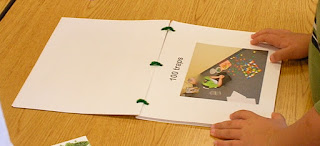Chapter 5 focuses on independent reading, or sustained silent reading (SSR). This is the counterpart to reading aloud. Kids spend a certain amount of time quietly reading alone.
Disclaimer: I'm hosting the chapter that discusses SSR but I'm definitely not an expert in this. In fact, I struggled with this last year. I'm on a learning journey about this and learned some things from reading the chapter.
From a chapter full of great things, I extracted these nuggets--
- Reading aloud should result in independent reading. Among all the purposes of reading aloud, building a passion for reading is high on the list. That passion should help motivate kids to read for themselves.
- Reading is a skill. The more you do it, the better you are at it. The less you do it, the more difficult it will be. SSR develops that skill by providing the practice. Reading becomes more automatic. The reader is more fluent as he reads and comprehends more.
- More reading is a result of high expectations of pleasure from reading and low barriers to reading. The Fraction of Selection was a new concept for me - expectation of reward for an activity divided by effort to get the reward equals frequency of the activity. I can see this applying in areas beyond reading.
- All kinds of reading material "counts." Reading magazines, books, comic books, and newspapers are all valid. Sometimes we may want to dismiss magazines or "lite" books, but those can develop engaged, passionate readers that will go on to read "heavier" content. I've even used some of this lite reading material in my read-alouds. (See my post on the Spiderman book.) All reading shouldn't consist of this lighter fare but we shouldn't discount it either.
- As with everything we do, we should always examine why we are doing something. This fact came up with the discussion on programs like Accelerated Reader. Is the purpose to build motivation for reading? Or is the purpose to "increase scores" or find another way to give a grade?
- Teacher/parent/adult must be a role-model for independent reading, for pleasure reading. Kids need to see us quietly reading at the same time they are reading. We need to help kids connect with books they may enjoy. We need to talk about books we've read - and talk about them passionately. And we must be passionate about reading if we want kids to feel passionate.
- I will include time each day for independent reading. I need to communicate my expectations and practice with them. We need to start with a short timeframe and work up.
- I will read a book for pleasure while they are reading. I'll sit at the front of the room and read instead of do other things. I won't read an adult novel (although that would be okay) but I will read some chapter books or other "advanced" books to pique their interests.
- I will talk about books, in both more formal and informal settings. I will ask kids individually and in groups about the books they are reading. And it won't always (or even usually) be for testing comprehension. So much discussion I've led about books has been for assessment or recall. That's important, but we need to talk about books like we talk about their families, their TV viewing, and their toys.
There's so much more in this chapter. In the comments below, note what spoke to you, especially if it's something that I didn't mention. Or write your own blog post and add it to the linky below.
(Next up: Chapter 6 will be hosted by Vanessa on Pre-K Pages.)


